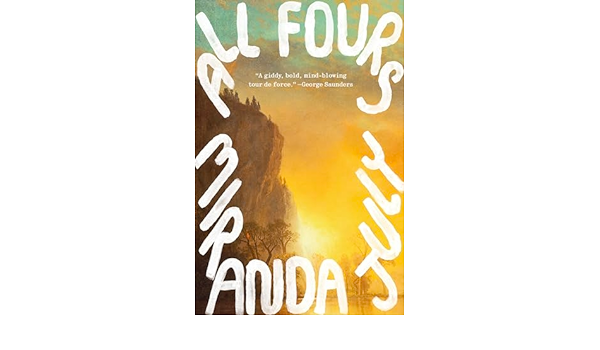
At the beginning of All Fours, Miranda July describes two kinds of people.
“In life there are Parkers and there are Drivers,” July writes, “Drivers are able to maintain awareness and engagement even when life is boring…they get joy from petting a dog or hanging out with their kid and that’s enough… Parkers, on the other hand… need a discrete task that seems impossible, something that takes every bit of focus and for which they might receive applause.”
The panic of being a Parker is what sets July’s protagonist on a cross country road trip; it is also exactly that set of characteristics that lead her to forgo the journey and stay at a motel 30 miles away from her house. It’s an absurd premise, one that gets a few laughs from my friends as I describe to them the plot of the book. But, July’s novel is a smart reversal of the road novel. It is witty and earnest and finds freedom, ironically, in staying put.
“I didn’t think a lot about death, but I was getting ready to,” July’s protagonist thinks while driving. “I understood that death was coming and that all my current preoccupations were kind of naïve; I still operated as if I could win somehow. Not the vast and total winning I had hoped for in the previous decades, but a last chance to get it together before winter came, my final season”
As I followed the secluded vacation of the main character, a sort of abject horror overcame me. This is revolting, I thought. Would this be my life? The page I was reading looked like this:

July calls this “the cliff.” The sharp drop of women’s estrogen and libido in between forty-five and fifty.
July’s protagonist is haunted by the image of her grandmother, who “jumped out of the window of her New York City apartment building when she was fifty-five. No warning except she had recently been lamenting all her gray hairs.”
While reading I couldn’t help but feel lightheaded – not at July’s writing, which is evocative and physical and reminiscent of Sheila Heti – but rather at the plummeting feeling of doom that women feel when they realize the culmination of their life is some awful disease that no one cares much about.
The novel began as July’s intent to reframe the aging narrative. “I interviewed many, many gynecologists. I interviewed naturopaths. I interviewed older women about their experience of this time,” she said in a conversation with Elif Batuman. Though little of the research went into the actual book, July was interested in “the idea that there might actually be something kind of hot in [menopause]”
People often write stories that imagine the conception of womanhood; rarely do we write about its fall. July’s novel feels like the mirror of a coming of age novel – a wild and exciting sexual fantasy, a rupture in the self, a heightened awareness of the plight of every other woman. Despite never leaving the greater Los Angeles area, July’s protagonist emerges from her motel chrysalis a changed woman.
July has been criticized for being “strenuously quirky,” which feels like an ill-informed attempt to belittle her characters into a series of personality traits. It is true that often I wondered why any of the other characters put up with the deliriously bad decisions of the protagonist. But to read All Fours like that would be to neglect the contradictions of the female psyche, the holistic care with which July builds her characters.
Where July shines is her endearment to the strange intimacies of women and womanhood. “I’m forever wanting to know what it feels like to be other people. What were we all doing? What the hell was going on here on Earth?” her protagonist asks. After every decision she makes, a call is placed to a different woman in the character’s life – her best friend, her mother, her older friend who is “obsessed with hot flashes.”
At the end, the July’s protagonist makes a group text with every woman above forty that she knows, and asks them about menopause. The women feel like some sort of chorus, as their texts clog up the page. “My chronic migraines stopped completely after menopause…I feel like my true self… What other people do, think, or say has become kind of irrelevant since I stopped bleeding.”
For July, the cliff is a peak – to stand at its brink is the beginning of a great adventure. And the fall may be the most thrilling part of the ride. In the same way, July’s vast universe – her delightful and obscure characters, twists of a completely unpredictable narrative, and incisive wit – can’t help but pull a reader in. Slowly, All Fours becomes a book that you cannot live without finishing.
This book was provided as a NetGalley from Riverhead.
